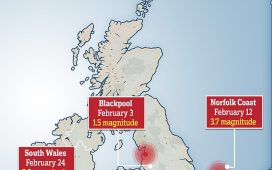[ad_1]

Coral reefs and the vital ecosystem support they offer to the oceans, fish and humans have declined by about half since the 1950s, a new study has found.
Scientists at the University of British Columbia (UBC) in Canada have gathered an array of data from coral reef surveys and fishery catches to assess what impact the world’s declining coral is having on food webs and ecosystems.
The researchers found the huge loss of living coral coverage in the oceans – about 50 per cent since the 1950s – has been matched by an equivalent fall in the “ecosystem services” these reefs offer.
“Coral reefs are known to be important habitats for biodiversity and are particularly sensitive to climate change, as marine heat waves can cause bleaching events,” said Tyler Eddy, one of the scientists involved.
“Coral reefs provide important ecosystem services to humans, through fisheries, economic opportunities, and protection from storms.”
The study suggests the catching of fish sustained by coral reefs peaked nearly 20 years ago and has been declining ever since even though there has been an increase in efforts to extract fish from these parts of the ocean.
As well as the total numbers of fish falling, the diversity of different species living on reefs has also plummeted by more than 60 per cent.
“Our analysis indicates that the capacity of coral reefs to provide ecosystem services has declined by about half globally,” said William Cheung, professor at the UBC Institute for the Oceans and Fisheries and senior author of the research. “This study speaks to the importance of how we manage coral reefs not only at regional scales, but also at the global scale, and the livelihoods of communities that rely on them.”
Coral reefs, which are made up of tiny living organisms called polyps, cover only one per cent of the Earth’s surface but are vital building blocks of a healthy marine ecosystem. By providing food, and habitats for breeding and nursery grounds, they support around 25 per cent of all marine life, including over 4,000 species of fish.
They also benefit humans, not only by nurturing fish eaten by millions, but also by protecting shoreline communities from waves and storms.
However, coral is under threat around the world, primarily because of climate change. Rising ocean temperatures causes tiny algae called zooxanthellae – which provide most of the coral’s food and nutrients – to be expelled from their hosts which in turn gradually kills the reef, turning its normally vibrant colours into a dull white.
This bleaching of coral reefs turns them from a critical life support system for marine life into an oceanic graveyard.
The study’s authors also warned indigenous coastal human communities which rely on coral could be threatened by the ongoing degradation of the world’s reefs.
“Fish and fisheries provide essential micronutrients in coastal developing regions with few alternative sources of nutrition” they wrote. “Coral reef biodiversity and fisheries take on added importance for Indigenous communities, small island developing states, and coastal populations where they may be essential to traditions and cultural practices.
“The reduced capacity of coral reefs to provide ecosystem services undermines the well-being of millions of people with historical and continuing relationships with coral reef ecosystems.”
[ad_2]
READ SOURCE





